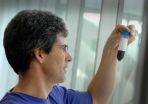(Press-News.org) INDIANAPOLIS – The March 2011 issue of the journal Heath Affairs highlights an evidence-based model of geriatric care management developed, implemented and tested by researchers and clinicians from Indiana University, the Regenstrief Institute and Wishard Health Services.
Geriatric Resources for Assessment and Care of Elders (GRACE) optimizes the health and functional status of community dwelling lower income, older adults. GRACE is now in use by Wishard Health Services, the third-largest safety-net health organization in the United States; by HealthCare Partners Medical Group, a large managed care organization in Southern California and by a growing number of other organizations.
A previous clinical trial found that GRACE improves health and quality of life, decreases emergency department visits and lowers hospital admission rates in lower income older adults at high risk for hospital admission. The care delivery model focuses on the many issues faced by older adults -- access to needed services, medications, mobility, depression, transportation, nutrition, as well as other health issues of aging.
"Healthcare reform is calling out for ways to improve health and lower costs. We have found a strategy to do that for a very vulnerable growing population in a way that shows cost savings over time and has the added benefit of providing services that these seniors desperately need but can't get elsewhere," said Steven R. Counsell, M.D., Mary Elizabeth Mitchell Professor of Geriatrics at the IU School of Medicine, an IU Center for Aging Research center scientist, a geriatrician at Wishard, and an affiliated scientist of the Regenstrief Institute, the principal investigator of the GRACE clinical trial. He is currently leading GRACE dissemination initiatives while working to influence health policy to improve integration of medical and social care for vulnerable elders.
The key to GRACE is two teams. The support team, consisting of a nurse practitioner and a social worker, meet with each patient in the home to conduct an initial comprehensive geriatric assessment from the medicine cabinet to the kitchen cabinet. Based on the support team's findings, a larger interdisciplinary team (including a geriatrician, pharmacist, mental health social worker, and community-based services liaison) helps develop an individualized care plan.
Then the ball is back in the support team's court. The nurse practitioner and the social worker meet with the patient's primary care doctor to come up with a healthcare plan consistent with the patient's goals, such as maintaining the ability to participate in social and religious activities. The support team then works with the patient to implement the plan which contains strategies for medical issues of concern as well as elements related to maintaining quality of life. With the assistance of an electronic medical record and web-based tracking system, the GRACE support team provides ongoing comprehensive care management.
Because it improves health and quality of life, GRACE is cost effective. By the second year GRACE even saves money for the sickest (those with three to four chronic diseases). Results of the GRACE trial were published in the Dec. 12, 2007, issue of the Journal of American Medical Association (JAMA). The cost analysis of the GRACE model was published in the August 2009 issue of the Journal of the American Geriatrics Society.
"The GRACE model improves health and reduces healthcare costs by lowering hospitalization rates in high risk seniors. The GRACE intervention can be financed by a health plan under managed care Medicare using the savings from fewer hospitalizations to offset GRACE program expenses. Most seniors, however, are not enrolled in managed care Medicare plans, and most services provided by the GRACE program are not currently reimbursed by traditional fee-for-service Medicare. Thus, payment reform is needed for broad dissemination of the GRACE model to benefit seniors under traditional Medicare. We are pleased that the newly created U.S. government Center for Medicare and Medicaid Innovation is looking at GRACE and other novel ways of delivering medical care and paying healthcare providers that can improve health and also save money for Medicare and Medicaid," said Dr. Counsell.
INFORMATION:
Development of GRACE was funded by the National Institute on Aging, the Nina Mason Pulliam Charitable Trust and Wishard Health Services. Dissemination of GRACE to Healthcare Partners Medical Group was supported by a grant from The SCAN Foundation, based in Long Beach, California. The SCAN Foundation is dedicated to creating a society in which seniors receive medical treatment and human services that are integrated in the setting most appropriate to their
needs.
The Indiana University School of Medicine, the Regenstrief Institute and Wishard Health Services are located on the Indiana University-Purdue University Indianapolis campus.
Aging with grace: In-home assessments lead to better care, lower health costs
2011-03-09
ELSE PRESS RELEASES FROM THIS DATE:
Oops -- graphene oxide's solubility disappears in the wash
2011-03-09
Graphene Oxide has had a scrum of researchers fall upon it as it retains much of the properties of the highly valued super material pure Graphene, but it is much easier, and cheaper, to make in bulk quantities; easier to process; and its significant oxygen content appears to make it soluble in water. However new research led by University of Warwick Chemist Dr Jonathan P. Rourke and Physicist University of Warwick Physicist Dr Neil Wilson, has found that that last assumption is incorrect and unfortunately Graphene oxide's solubility literally comes out in the wash.
Drs ...
The cerebellum provides clues to the nature of human intelligence
2011-03-09
Milan, Italy, 8 March 2011 – Research suggests that intelligence in humans is controlled by the part of the brain known as the 'cortex', and most theories of age-related cognitive decline focus on cortical dysfunction. However, a new study of Scottish older adults, reported in the April 2011 issue of Elsevier's Cortex (http://www.sciencedirect.com/science/journal/00109452), suggests that grey matter volume in the 'cerebellum' at the back of the brain predicts cognitive ability, and keeping those cerebellar networks active may be the key to keeping cognitive decline at ...
MU chemist discovers shortcut for processing drugs
2011-03-09
COLUMBIA, Mo. – A prolific University of Missouri chemist has discovered a quicker and easier method for pharmaceutical companies to make certain drugs.
Jerry Atwood, Curator's Professor and Chair of the Department of Chemistry in the MU College of Arts and Science, has recently published a paper – his 663rd in a refereed journal – that states that highly pressurized carbon dioxide at room temperature could replace the time consuming and expensive methods currently used to manufacture certain pharmaceutical drugs.
In the article, "A New Strategy of Transforming Pharmaceutical ...
Study shows no-till's benefits for Pacific Northwest wheat growers
2011-03-09
This release is available in Spanish.
Wheat farmers in eastern Oregon and Washington who use no-till production systems can substantially stem soil erosion and enhance efforts to protect water quality, according to research by U.S. Department of Agriculture (USDA) scientists.
Agricultural Research Service (ARS) hydrologist John Williams led a study that compared runoff, soil erosion and crop yields in a conventional, intensively tilled winter wheat-fallow system and a no-till 4-year cropping rotation system. ARS is USDA's chief intramural scientific research agency, ...
Right-handers, but not left-handers, are biased to select their dominant hand
2011-03-09
Milan, Italy, 8 March 2011 – The vast majority of humans – over 90% – prefer to use their right hand for most skilled tasks. For decades, researchers have been trying to understand why this asymmetry exists. Why, with our two cerebral hemispheres and motor cortices, are we not equally skilled with both hands? A study from the University of Aberdeen in the UK, published in the April 2011 issue of Elsevier's Cortex (http://www.sciencedirect.com/science/journal/00109452), suggests that the explanation may stem from actions that require us to use both hands at the same time, ...
Boy toddlers need extra help dealing with negative emotions
2011-03-09
URBANA – The way you react to your two-year-old's temper tantrums or clinginess may lead to anxiety, withdrawal and behavior problems down the road, and the effect is more pronounced if the child is a boy who often displays such negative emotions as anger and social fearfulness, reports a new University of Illinois study.
"Young children, especially boys, may need their parents' help working through angry or fearful emotions. If you punish toddlers for their anger and frustration or act as if their fears are silly or shameful, they may internalize those negative emotions, ...
Study analyzes role of PARP enzyme in eukaryotes
2011-03-09
An Ohio State University molecular biologist leveraged a supercomputer to help better define the family tree of a group of enzymes that have been implicated in a wide range of human diseases and are important targets for anti-cancer therapies.
Along with several OSU colleagues, Rebecca S. Lamb, Ph.D., an assistant professor of Molecular Genetics, recently analyzed the evolutionary history of the poly(ADP-ribose)polymerase (PARP) superfamily.
These proteins are found in eukaryotes, a wide range of organisms – animals, plants, molds, fungi, algae and protozoa –whose ...
As we sleep, speedy brain waves boost our ability to learn
2011-03-09
Scientists have long puzzled over the many hours we spend in light, dreamless slumber. But a new study from the University of California, Berkeley, suggests we're busy recharging our brain's learning capacity during this traditionally undervalued phase of sleep, which can take up half the night.
UC Berkeley researchers have found compelling evidence that bursts of brain waves known as "sleep spindles" may be networking between key regions of the brain to clear a path to learning. These electrical impulses help to shift fact-based memories from the brain's hippocampus ...
How long does a tuning fork ring?
2011-03-09
This release is available in German.
From the wooden bars in a xylophone or the head of a drum, to the strings and sound box of a guitar or violin, musical instruments are the most familiar examples of mechanical resonators. The actual mechanical vibrations of these instruments create acoustic waves that we hear as sound. The purity of the emitted tone is intimately related to the decay of the vibration amplitude, that is, the mechanical losses of the system. A figure of merit for mechanical losses is the quality factor, simply called "Q", which describes the number ...
First census finds surprisingly few white sharks off California
2011-03-09
In the first census of its kind, research led by UC Davis and Stanford University found that there are far fewer white sharks off central California than biologists had thought.
The study, published today in the journal Biology Letters, is the first rigorous scientific estimate of white shark numbers in the northeast Pacific Ocean. It is also the best estimate among the world's three known white-shark populations (the others are in Australia/New Zealand and South Africa).
The researchers went out into the Pacific Ocean in small boats to places where white sharks congregate. ...



